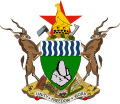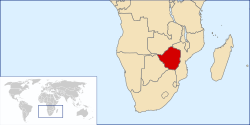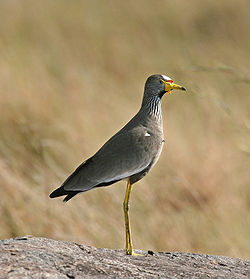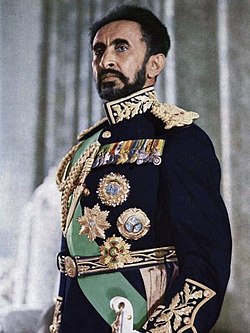Portal:Africa



Africa is the world's second-largest and second-most populous continent after Asia. At about 30.3 million km2 (11.7 million square miles) including adjacent islands, it covers 20% of Earth's land area and 6% of its total surface area. With nearly 1.4 billion people as of 2021, it accounts for about 18% of the world's human population. Africa's population is the youngest among all the continents; the median age in 2012 was 19.7, when the worldwide median age was 30.4. Based on 2024 projections, Africa's population will exceed 3.8 billion people by 2100. Africa is the least wealthy inhabited continent per capita and second-least wealthy by total wealth, ahead of Oceania. Scholars have attributed this to different factors including geography, climate, corruption, colonialism, the Cold War, and neocolonialism. Despite this low concentration of wealth, recent economic expansion and a large and young population make Africa an important economic market in the broader global context, and Africa has a large quantity of natural resources.
Africa is highly biodiverse; it is the continent with the largest number of megafauna species, as it was least affected by the extinction of the Pleistocene megafauna. However, Africa is also heavily affected by a wide range of environmental issues, including desertification, deforestation, water scarcity, and pollution. These entrenched environmental concerns are expected to worsen as climate change impacts Africa. The UN Intergovernmental Panel on Climate Change has identified Africa as the continent most vulnerable to climate change.
The history of Africa is long, complex, and varied, and has often been under-appreciated by the global historical community. In African societies the oral word is revered, and they have generally recorded their history via oral tradition, which has led anthropologists to term them "oral civilisations", contrasted with "literate civilisations" which pride the written word. African culture is rich and diverse both within and between the continent's regions, encompassing art, cuisine, music and dance, religion, and dress.
Africa, particularly Eastern Africa, is widely accepted to be the place of origin of humans and the Hominidae clade, also known as the great apes. The earliest hominids and their ancestors have been dated to around 7 million years ago, and Homo sapiens (modern human) are believed to have originated in Africa 350,000 to 260,000 years ago. In the 4th and 3rd millennia BCE Ancient Egypt, Kerma, Punt, and the Tichitt Tradition emerged in North, East and West Africa, while from 3000 BCE to 500 CE the Bantu expansion swept from modern-day Cameroon through Central, East, and Southern Africa, displacing or absorbing groups such as the Khoisan and Pygmies. Some African empires include Wagadu, Mali, Songhai, Sokoto, Ife, Benin, Asante, the Fatimids, Almoravids, Almohads, Ayyubids, Mamluks, Kongo, Mwene Muji, Luba, Lunda, Kitara, Aksum, Ethiopia, Adal, Ajuran, Kilwa, Sakalava, Imerina, Maravi, Mutapa, Rozvi, Mthwakazi, and Zulu. Despite the predominance of states, many societies were heterarchical and stateless. Slave trades created various diasporas, especially in the Americas. From the late 19th century to early 20th century, driven by the Second Industrial Revolution, most of Africa was rapidly conquered and colonised by European nations, save for Ethiopia and Liberia. European rule had significant impacts on Africa's societies, and colonies were maintained for the purpose of economic exploitation and extraction of natural resources. Most present states emerged from a process of decolonisation following World War II, and established the Organisation of African Unity in 1963, the predecessor to the African Union. The nascent countries decided to keep their colonial borders, with traditional power structures used in governance to varying degrees. (Full article...)
Selected article –

South Kasai (French: Sud-Kasaï) was an unrecognised secessionist state within the Republic of the Congo (the modern-day Democratic Republic of the Congo) which was semi-independent between 1960 and 1962. Initially proposed as only a province, South Kasai sought full autonomy in similar circumstances to the much larger neighbouring state of Katanga, to its south, during the political turmoil arising from the independence of the Belgian Congo known as the Congo Crisis. Unlike Katanga, however, South Kasai did not explicitly declare full independence from the Republic of the Congo or reject Congolese sovereignty.
The South Kasaian leader and main advocate, Albert Kalonji, who had represented a faction of the nationalist movement (the Mouvement National Congolais-Kalonji or MNC-K) before decolonisation, exploited ethnic tensions between his own ethnic group, the Baluba, and the Bena Lulua to create a Luba-focused state in the group's traditional heartland in the south-eastern parts of the Kasai region. As sectarian violence broke out across the country, the state declared its secession from the Congo on 9 August 1960 and its government and called for the Baluba living in the rest of the Congo to return to their "homeland". Kalonji was appointed president. Although the South Kasaian government claimed to form an autonomous part of a federal Congo-wide state, it exercised a degree of regional autonomy and even produced its own constitution and postage stamps. The state, supported by foreign powers, particularly Belgium, and funded by diamond exports, managed numerous crises, including those caused by the large emigration of Luba refugees, but became increasingly militarist and repressive. (Full article...)
Featured pictures –
Did you know (auto-generated) -

- ... that South African president Jacob Zuma requested a tour of a Sainsbury's supermarket during his state visit to the United Kingdom in 2010?
- ... that Carver Court in Coatesville, Pennsylvania, was built to house African-American steelworkers during World War II?
- ... that Pocatello mayor Les Purce was the first African-American political officeholder in Idaho?
- ... that South African civil rights activist Thambi Naidoo was arrested along with Mahatma Gandhi and sent outside of Transvaal for refusing to register?
- ... that Muhsin Hendricks of South Africa has been described as "the world's first openly gay imam"?
- ... that Malaysian businessman Lim Kok Wing was depicted as "King of Africa"?
Categories
Selected biography –
Haile Selassie I, (born Tafari Makonnen or Lij Tafari; 23 July 1892 – 27 August 1975) was Emperor of Ethiopia from 1930 to 1974. He rose to power as the Regent Plenipotentiary of Ethiopia (Enderase) under Empress Zewditu between 1916 and 1930. Widely considered to be a defining figure in modern Ethiopian history, he is accorded divine importance in Rastafari, an Abrahamic religion that emerged in the 1930s. A few years before he began his reign over the Ethiopian Empire, Selassie defeated Ethiopian army commander Ras Gugsa Welle Bitul, nephew of Empress Taytu Betul, at the Battle of Anchem. He belonged to the Solomonic dynasty, founded by Emperor Yekuno Amlak in 1270.
Selassie, seeking to modernise Ethiopia, introduced political and social reforms including the 1931 constitution and the abolition of slavery in 1942. He led the empire during the Second Italo-Ethiopian War, and after its defeat was exiled to the United Kingdom. When the Italian occupation of East Africa began, he traveled to Anglo-Egyptian Sudan to coordinate the Ethiopian struggle against Fascist Italy; he returned home after the East African campaign of World War II. He dissolved the Federation of Ethiopia and Eritrea, established by the United Nations General Assembly in 1950, and annexed Eritrea as one of Ethiopia's provinces, while also fighting to prevent Eritrean secession. As an internationalist, Selassie led Ethiopia's accession to the United Nations. In 1963, he presided over the formation of the Organisation of African Unity, the precursor of the African Union, and served as its first chairman. By the early 1960s, prominent African socialists such as Kwame Nkrumah envisioned the creation of a "United States of Africa". Their rhetoric was anti-Western; Selassie saw this as a threat to his alliances. He attempted to influence a more moderate posture within the group. (Full article...)
Selected country –
 |
 |
|

| ||
Zimbabwe, officially the Republic of Zimbabwe, is a landlocked country in southern Africa, between the Zambezi and Limpopo rivers. It borders South Africa to the south, Botswana to the southwest, Zambia to the northwest, and Mozambique to the east. The name Zimbabwe derives from "Zimba Remabwe" meaning "big house of stone" in the Shona language. Its use as the country's name is a tribute to Great Zimbabwe, site of the capital of the Empire of Great Zimbabwe. Zimbabwe's highest peak is Mount Nyangani, which lies within Nyanga National Park in the east of the country. The official language of Zimbabwe is English, however the majority of the population speaks Shona.
Under the leadership of former president Robert Mugabe and the current president Emmerson Mnangagwa, the economy of Zimbabwe declined from one of the strongest in Africa to one of the weakest and political tension has never been higher. In 1999, the Movement for Democratic Change was established and have campaigned for an end to "Mugabe's Reign of Terror". 80% of Zimbabweans are unemployed and inflation has soared to well over 15,000%. (Read more...)
Selected city –

Gaborone (UK: /ˌɡæbəˈroʊni, ˌhæb-/ GAB-ə-ROH-nee, HAB-, US: /ˌɡɑːbəˈroʊni, -neɪ/ GAH-bə-ROH-nee, -nay, Tswana: [χabʊˈrʊnɛ]) is the capital and largest city of Botswana, with a population of 246,325 based on the 2022 census, about 10% of the total population of Botswana. Its metropolitan area is home to 534,842 inhabitants at the 2022 census.
Gaborone is situated between Kgale Hill and Oodi Hill, near the confluence of the Notwane River and Segoditshane River in the southeastern corner of Botswana, within 15 kilometres (9.3 mi) from the South African border. The city is served by the Sir Seretse Khama International Airport. It is an administrative district in its own right, but is the capital of the surrounding South-East District. Locals often refer to the city as GC or Motse-Mshate. (Full article...)
In the news
- 24 April 2025 – Somali Civil War
- Al-Shabaab militants seize the town of Wargaadhi and its military base in Middle Shabelle, Somalia. More than 40 militants and twelve clan fighters are killed in related combat. (Al Jazeera)
- 24 April 2025 – Islamist insurgency in the Sahel
- The Beninese government announces that 54 soldiers were killed in an attack by Jama'at Nasr al-Islam wal Muslimin (JNIM) in the north of the country last week, after previously announcing only eight soldiers were killed. JNIM claims 70 soldiers were killed in the attack. (BBC)
- 22 April 2025 –
- Interpol rescues 33 West Africans, including people from Benin, Togo, Burkina Faso, and Ghana, from human trafficking rings in the Ivory Coast. (AP)
- 21 April 2025 – Spillover of the Sudanese civil war
- 2025 Nasir clashes
- The South Sudan People's Defence Forces capture the town of Nasir in Upper Nile State from the Nuer White Army. (Reuters)
- 21 April 2025 – Boko Haram insurgency
- The Islamic State claims responsibility for a series of deadly attacks targeting Christians and security forces in Borno and Adamawa, Nigeria earlier this month that killed at least nine people and injured several others. (Reuters)
Updated: 17:05, 26 April 2025
General images -
Africa topics
More did you know –
- ... that Dutch malacologist Adolph Cornelis van Bruggen is an expert in African land snails?
- ... that a 20‑day study reported by BirdLife International discovered 265 species of birds in Nki National Park?
- ... that Kalulu, an African boy who died in 1877, was modeled in Madame Tussauds and attended Dr. Livingstone's funeral in London?
- ... that Samuel Jackman Prescod became the first person of African descent elected to the Parliament of Barbados?
Related portals
Major Religions in Africa
North Africa
West Africa
Central Africa
East Africa
Southern Africa
Associated Wikimedia
The following Wikimedia Foundation sister projects provide more on this subject:
-
Commons
Free media repository -
Wikibooks
Free textbooks and manuals -
Wikidata
Free knowledge base -
Wikinews
Free-content news -
Wikiquote
Collection of quotations -
Wikisource
Free-content library -
Wikispecies
Directory of species -
Wikiversity
Free learning tools -
Wikivoyage
Free travel guide -
Wiktionary
Dictionary and thesaurus


























































































